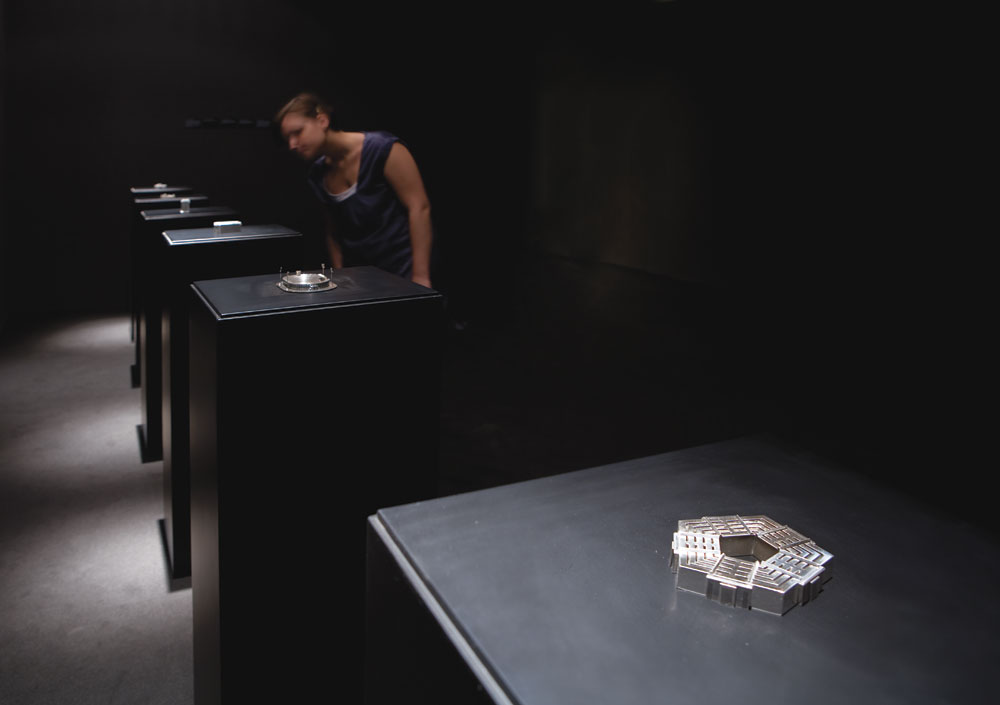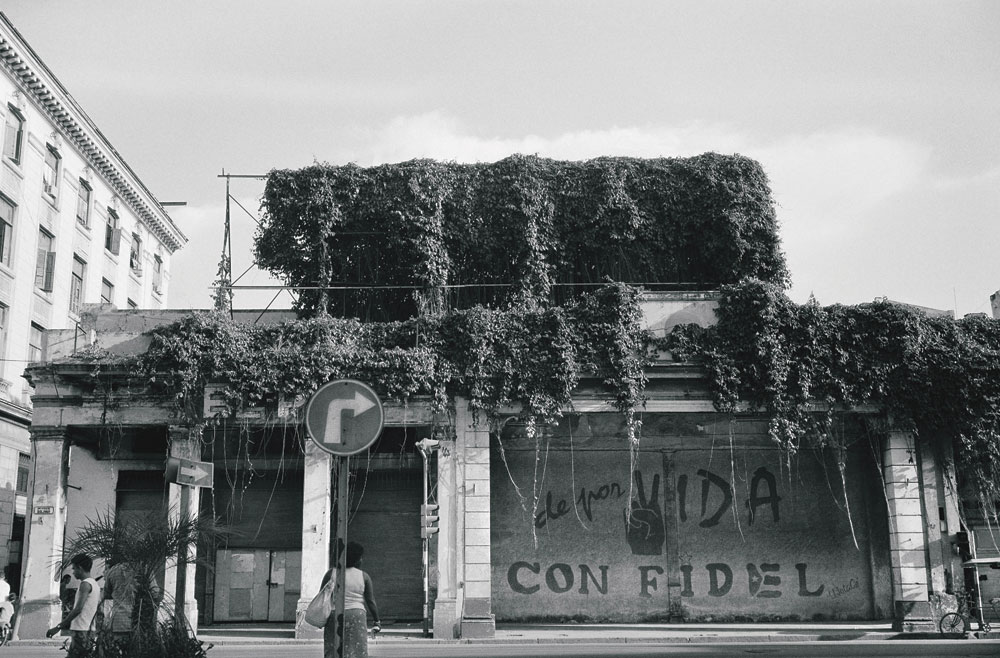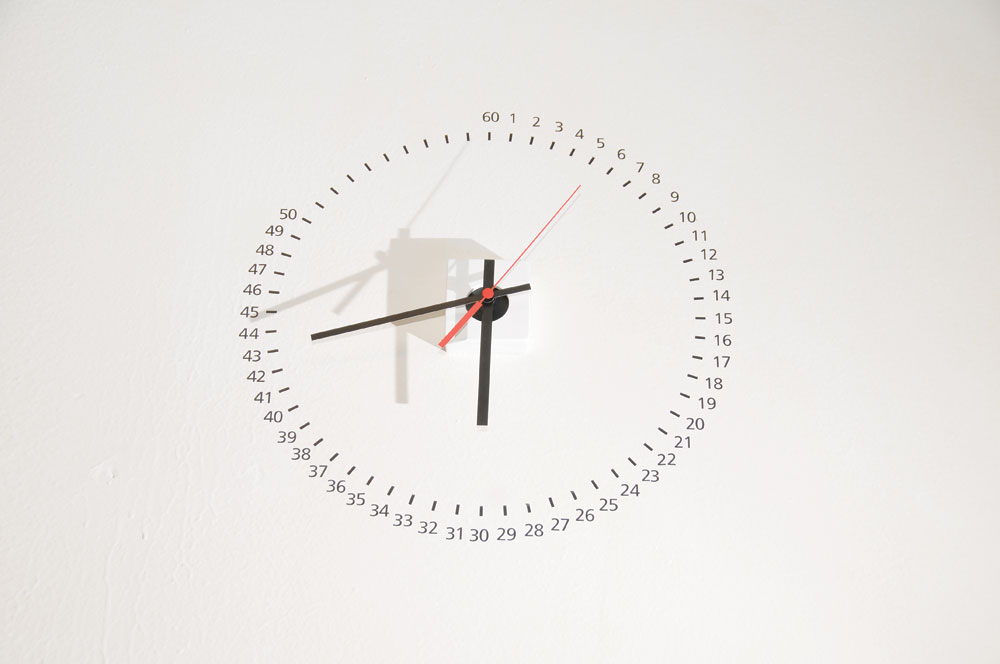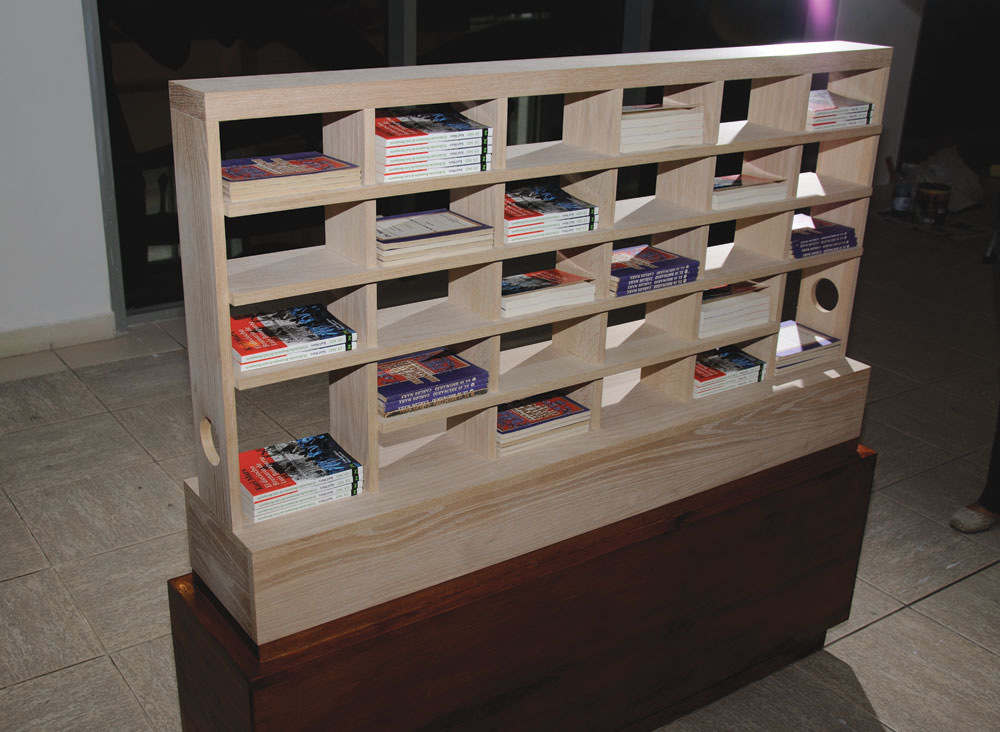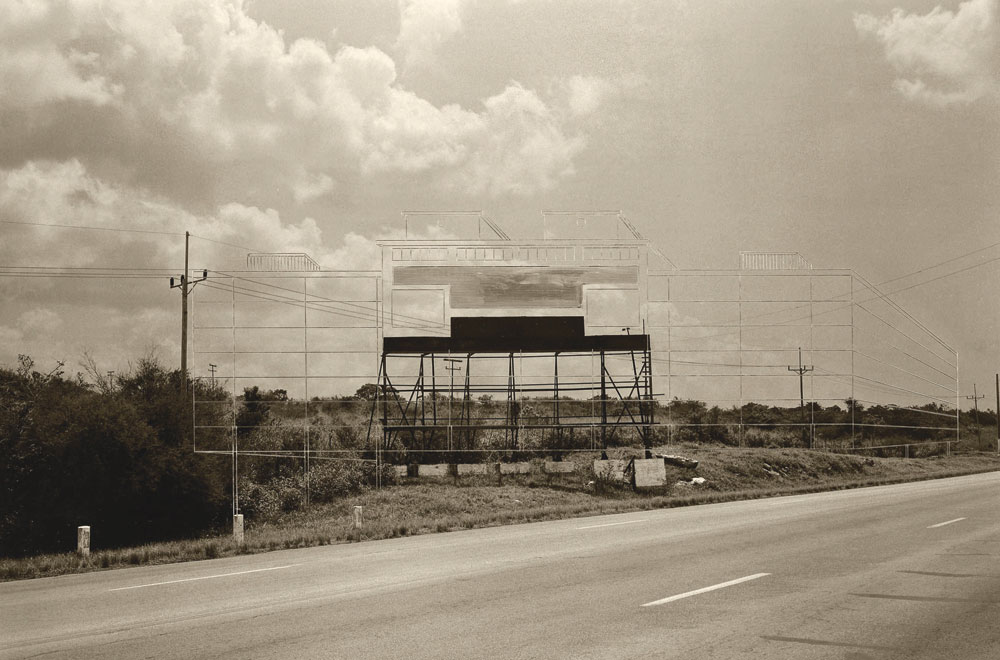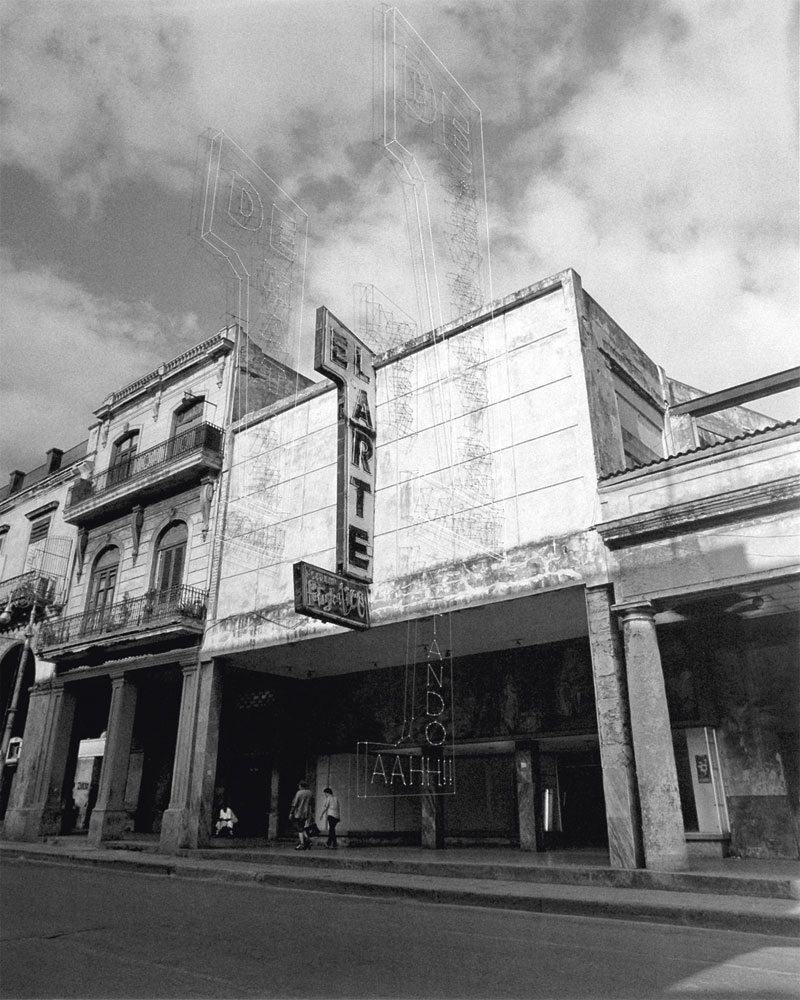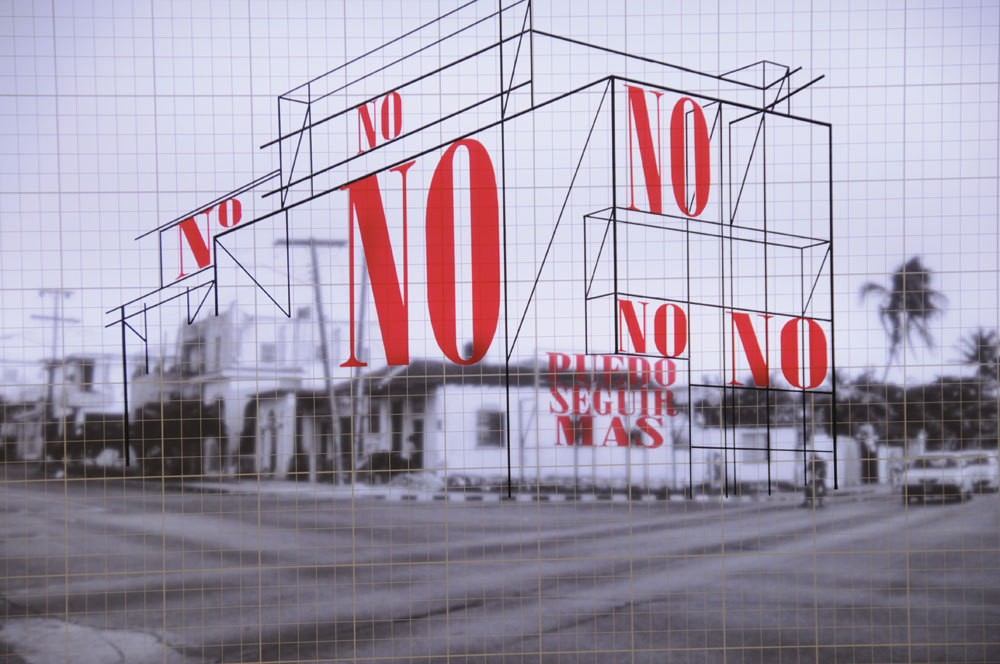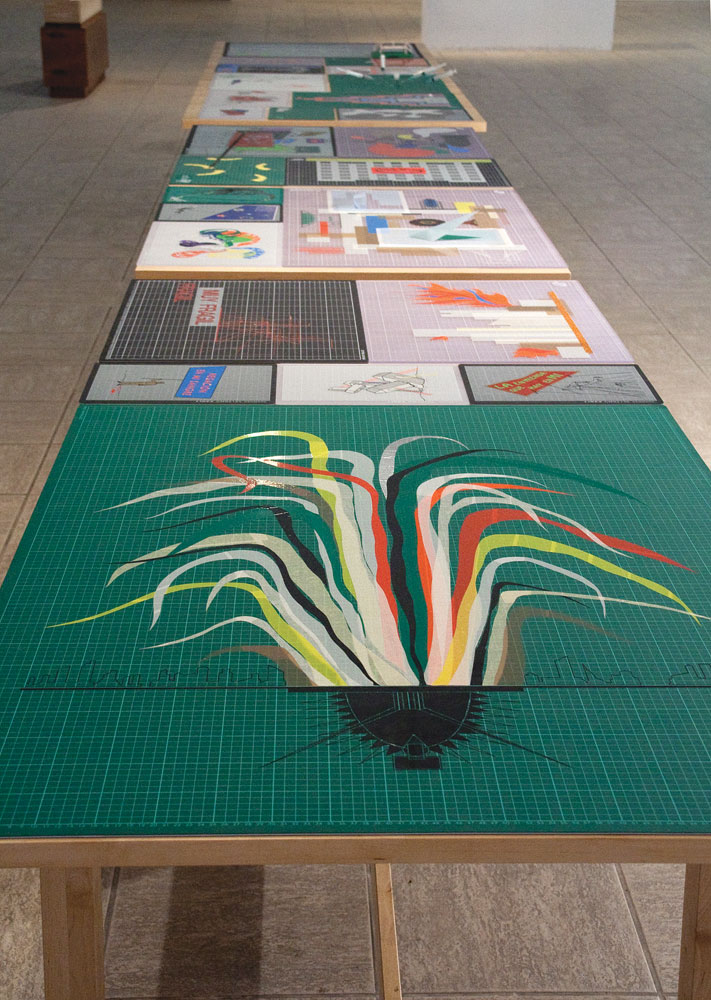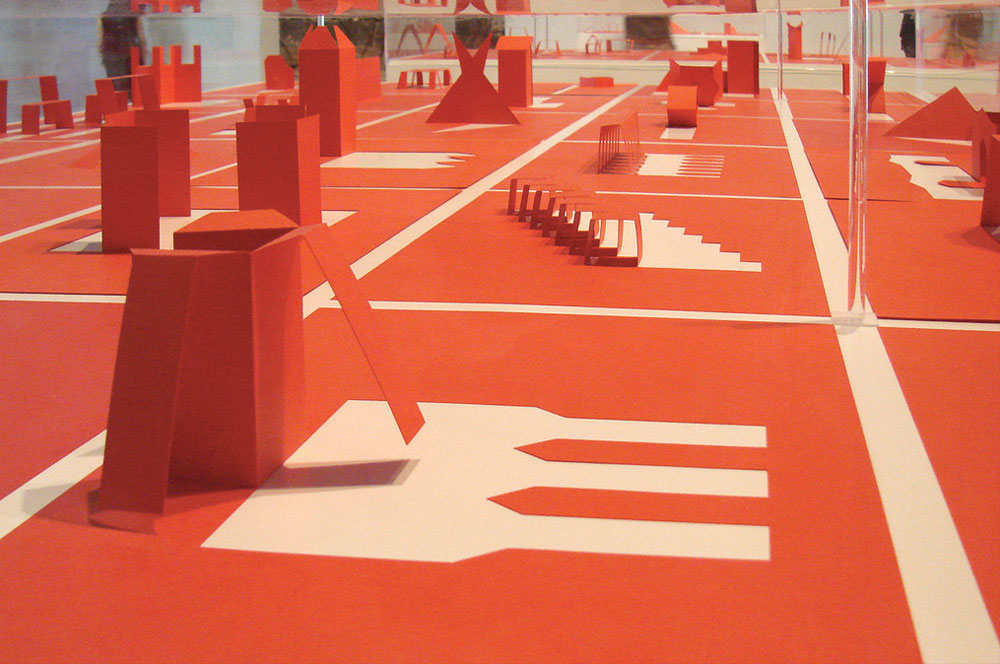Carlos Garaicoa
La enmienda que hay en mí (Making Amends)
August 23 – December 11, 2010
USF Contemporary Art Museum
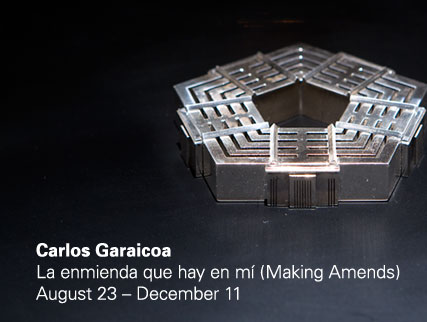
Carlos Garaicoa is known for his explorations of social and political issues in the context of urban architecture and the built environment. Inspired by his native Havana, Garaicoa adopts the city as a laboratory and metaphor for human existence, intervening on its landscape to offer searing and insightful commentary on issues such as architecture’s ability to alter the course of history, the failure of modernism as a catalyst for social change, human rights, and the frustration and decay of 20th century utopias.
Working across artistic media, Garaicoa takes a multidisciplinary approach that defies categorization. In several projects, his ideas evolve over series of black and white photographs altered and amended in various ways. Untitled (Sentences) [Sin título (frases)], 2009, documents the artist’s perambulations through Havana’s formerly bustling downtown commercial center. Departing from the fanciful names emblazoned on now deteriorated or abandoned storefronts, he composes poetic responses—part lamentation, part political critique—in pins and needles directly on the photographs.
In other works, Garaicoa engages architecture and the built environment through sculpture and installation. The Crown Jewels (Las joyas de la corona), 2009, consists of eight cast silver models of international sites of military authority, surveillance and repression, including Cuba’s Villa Marista, the East German Stasi, Guantánamo Naval Base, the Pentagon, and the KGB. Intricate and intimately sized, they are displayed separately in glass vitrines. Bend City, 2009, one of the artist’s exquisite cut paper installations, depicts an entire city composed of imaginary forms.
Driven by a belief in the artist’s moral obligation towards society, Garaicoa creates new artistic vocabularies in order to discuss social and political issues that resonate in both local and global contexts.
Carlos Garaicoa (b. 1967, Havana, Cuba) lives and works in Madrid, Spain, and Havana, where he studied thermodynamics at the Instituto Hermanos Gómez and visual art at the Instituto Superior de Arte. Since 1991, Garaicoa has exhibited extensively at international venues including the 53rd Venice Biennale and Documenta 11. His works belong to public and private collections including the Solomon R. Guggenheim Museum, Tate Modern (London), Museum of Modern Art (New York), and El Museo Nacional de Arte Centro de Arte Reina Sofia (Madrid).
PRESS
Social statements
St. Petersburg Times
Sunday, September 12, 2010
Spotlight: Carlos Garaicoa
OnView Magazine
August/September, 2010 | pp.92-93
La Habana, como metáfora universal
CENTRO Tampa
September 3, 2010
Cuba's Carlos Garaicoa exhibits at USF
Maddux Report News Wire
August 20, 2010
“Making Amends:” Carlos Garaicoa in Tampa
Cuban Art News
June 7, 2010
DOWNLOADS
Press Release | Exhibition Brochure | Exhibition Checklist
RELATED LINKS
carlosgaraicoa.com
National Museum of Fine Arts, Havana
Casting miniature replicas in silver, Garaicoa transforms sites of state-sponsored surveillance and repression into precious objects. From KGB headquarters in Moscow to the U.S. naval base at Guántanamo Bay, Cuba, the delicate replicas invite viewers to consider the role architecture plays in constructing state power and civic memory.
In Garaicoa’s drawing, a billboard frame atop an abandoned building emblazoned with the slogan “For Life with Fidel!” extends into a massive trellis overtaken by irrepressible vines.
Garaicoa’s gesture of setting a modernist clock to run backwards invites viewers to imagine the possibilities of revisiting and revising social and political events.
Through his invocation of Karl Marx’s landmark text, The Eighteenth Brumaire of Louis Bonaparte, Garaicoa’s sculpture invites viewers to consider critically the history of revolutionary politics in Cuba. How has the shape of lived experience on the island measured up against political rhetoric?
Carving lines into photographs mounted on metal and stucco, Garaicoa engraves an imagined architecture into Havana’s existing landscape—at times suggesting a socialist utopia more fully realized, at others performing an absurdist intervention into a forsaken landscape.
Writing with thread and pins atop black-and-white photographs, Garaicoa crafts “street haikus” in response to storefront signs that once trumpeted Havana’s commercial vitality.
Appropriating Havana’s empty billboards as a space for expression, Garaicoa draws fictive signage and architecture onto photographs of existing places, filling both real and invented frames with poetic messages instead of state propaganda.
Using cut adhesive tape to compose images on artists’ cutting mats, Garaicoa explores social, political and personal themes that resonate throughout his work.
Like Rorschach inkblots, the paper buildings of Bend City entice viewers to project meaning onto their forms. Silhouettes of imaginary structures, cut into thin sheets of red cardboard, comprise a cityscape open to dreams of change and revolution.
All images Courtesy of Studio Carlos Garaicoa
Photographs: Roxana Gonzalez & Fernando Fors; Eddy A. Garaicoa
The exhibition Carlos Garaicoa: La enmienda que hay en mí (Making Amends) first opened in March 2009 at the National Museum of Fine Arts during the 10th Havana Biennial in Havana, Cuba, and was curated by Corina Matamoros, Curator of Contemporary Cuban Art at the National Museum of Fine Arts, Havana. For its U.S. debut at USFCAM, the exhibition is co-curated by Matamoros and Noel Smith, Curator of Latin American and Caribbean Art, USF Institute for Research in Art.
Carlos Garaicoa is supported, in part, by the Stallvik Art and Education Foundation, Inc., the USF Cuban American Student Association (CASA), and the USF Institute for the Study of Latin America and the Caribbean (ISLAC). The Institute for Research in Art is recognized by the State of Florida as a major cultural institution and receives funding through the State of Florida, Department of State, Division of Cultural Affairs, the Florida Council on Arts and Culture, and the National Endowment for the Arts. The USF Contemporary Art Museum is accredited by the American Association of Museums.

